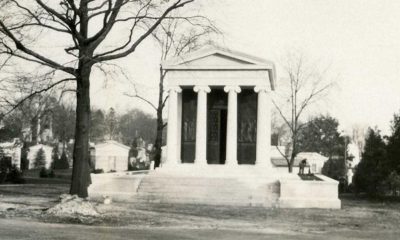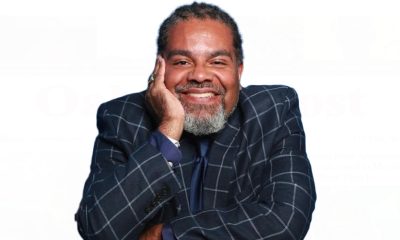National
Attorney Feels Driven to Solve 1940 Slaying of NAACP Member

In this June 10, 2015, photo, retired attorney Jim Emison sits in his home office in Alamo, Tenn. (AP Photo/Mark Humphrey)
Lucas L. Johnson II, ASSOCIATED PRESS
BROWNSVILLE, Tenn. (AP) — The man in the black-and-white photograph on Jim Emison’s desk seems to look right into him, all but demanding to not be forgotten. Emison is doing his best to oblige.
The photo features a man named Elbert Williams and two dozen other charter members of the NAACP’s Brownsville branch, an audacious group of men and women who registered black voters in West Tennessee in the early days of the civil rights movement.
Williams would be dead the following year, killed by unknown assailants in Brownsville on June 20, 1940 — more than two decades before NAACP leader Medgar Evers was gunned down by a Klansman outside his Jackson, Mississippi, home in 1963. Williams’ slaying was never solved, but Emison, a 71-year-old white, retired attorney, hopes to change that.
“We should do everything we can do to see who killed this man,” Emison said. “If there is anybody in a group that may have done it that’s still living, they need to be brought to justice.”
Three-quarters of a century after what some historians believe to be the first NAACP member killed for daring to speak up for civil rights, Emison has gotten federal authorities to take another look at it.
In the process, Emison just might make peace with a ghost from his own family’s past.
Emison’s obsession with Williams’ death grew more out of what he didn’t hear than what he did.
When he was a child, Emison sometimes heard his father, grandfather and uncle — all lawyers — talk about lynchings and other atrocities against African Americans. Once his uncle showed him a tree not far from Brownsville where he said a black man had been hanged.
Emison’s relatives seldom discussed the stories behind the crimes — doing so ran counter to a code of silence typical of small Southern towns. White people who knew about violent racist incidents usually didn’t share their secrets. Black people who had an inkling kept their mouths shut out of fear.
But Emison said the hanging bothered his father, and he talked to him about it.
His father’s uncle had been the Crockett County sheriff. Emison said a mob came to the jail one day in 1929 to seize and lynch an arrested man named Joseph Boxley, who had been accused of assaulting a woman. He said it’s unclear whether the mob forcibly took the man, or the sheriff willingly turned over the key. ButEmison said he’ll never forget his father saying he was afraid his uncle “did not act honorably that night,” words that have haunted Emison to this day.
“When it’s somebody that’s in your family, who may have been able to prevent it and didn’t, then that’s disturbing,” he said.
As a young boy growing up in the South, those conversations fostered a sense of outrage, a growing desire for justice that stayed with Emison during more than 40 years of trying cases in the Brownsville courthouse. Many of his clients were African American. Some of them he represented pro bono.
After all those years in the courthouse, Emison said he was shocked that he hadn’t heard about Williams’ case. And as he learned more, his anger only grew.
“It was just like he was discarded; valueless, worthless,” he said.
In 2012, Emison was researching a story he planned to write about a court case when he came across an online article about two lynchings in 1937 and 1940.
The latter was Williams’ killing. Emison ordered FBI and Department of Justice case files from the U.S. National Archives. To his surprise, officials there sent him un-redacted copies.
The records showed that Brownsville police, upset because the local NAACP branch was registering blacks to vote, had led an effort to force its members out of town. Then-U.S. Assistant Attorney General Wendell Berge said in a letter to U.S. District Attorney William Clanahan that the “obvious purpose” of the police and others had been to “frighten the entire colored population of Brownsville and thus prevent qualified Negroes from exercising their franchise.”
Some of the members left town, but Williams stayed behind. When the police got a tip that he was planning an NAACP meeting at his home, a group of men led by police officer Tip Hunter went to his residence, said they needed to question him outside and then took him away. Williams’ body was found three days later in the nearby Hatchie River.
No autopsy was performed. A coroner’s jury ruled the body was “decomposed so badly we could not make thorough examination” and that the cause of death was believed to be by “foul means by persons unknown.”
Williams’ wife, Annie, and his father identified the body, and she soon moved to New York. Later, in an exclusive interview with the Amsterdam News, a black weekly in New York, Annie Williams said the local authorities had tried to prevent her from seeing her slain husband, and that “the coroner had already issued the order to have the body buried as soon as possible.”
“It was only because I insisted that they let me look at it. It was a terrible sight, but I recognized him. His head was swollen twice its normal size. There were two holes in his chest that looked like bullet holes, the skin on his arms, legs, buttocks was bruised and blistered. His arms and legs, I heard, had been tied with rope and his body weighted down by a heavy log tied around his neck.”
The Justice Department initially ordered the case presented to a federal grand jury, then mysteriously reversed itself and closed the case in early 1942. It did so in spite of evidence gathered by Thurgood Marshall, then special counsel to the NAACP, who went on to become the U.S. Supreme Court’s first African-American justice in 1967.
Emison wants the case reopened and Williams’ body exhumed, despite some resistance from a few people in the community, including one who told him “the past ought to be left to die, and not resurrected.”
But Emison has ignored them. He’s spent hours interviewing Williams’ descendants, relatives of NAACP members from the branch and even family members of two police officers — both now deceased — who went to Williams’ home that night. Relatives of the officers declined interviews with The Associated Press.
Emison even has suspicions about the killers. He believes exhuming the body could lead to a murder weapon, considering Williams’ wife said she saw what looked like bullet holes in his chest. Emison recently turned his findings over to Justice Department officials who he said are giving Williams’ case serious consideration despite the department’s announcement last year that it will likely stop prosecuting civil rights-era murders that occurred in the South.
Williams’ slaying wasn’t among the cases the Justice Department re-examined in recent years, in part because it hadn’t resurfaced until Emison started pushing.
“I am optimistic that they will be interested in this one,” Emison said. “It’s older, but it is of great historic importance.”
Edward Stanton III, the U.S. Attorney for the Western District of Tennessee, told The Associated Press the department is reviewing materials from the case, but didn’t say when a decision will be made.
“We’re giving a strong look at the information provided,” Stanton said.
Leslie McGraw, Williams’ great-niece, called Emison’s efforts “validating.”
“It didn’t seem like anybody was really interested in seeking justice,” said McGraw, who lives in Ann Arbor, Michigan.
Cornell William Brooks, the NAACP’s national president, spoke at a memorial for Williams on Saturday in Brownsville that was attended by more than 500 people. Brooks flew in from Charleston, South Carolina, where just a few days earlier a white gunman killed nine people during a prayer meeting at a historic black church.
During his speech, Brooks called Williams “the first martyr of the NAACP,” and he said those people killed at the church are also martyrs who won’t be soon forgotten.
“These two things are important together,” Brooks said. “Because what it says to me is that no sacrifice should be forgotten; no sacrifice should ever disappear into the sands of time.”
Following the memorial service, a historical marker was unveiled in Williams’ honor and Emison hopes the renewed attention won’t end there.
Patricia Sullivan, a history professor at the University of South Carolina, wrote about Williams’ case in “Lift Every Voice: The NAACP and the Making of the Civil Rights Movement.”
She said his death speaks to the courage required to keep up the fight for civil rights.
“It’s central to understanding what the struggle has been about, and is about,” Sullivan said. “When I look at someone like Elbert Williams … you see that people were willing to risk everything if they thought change was possible.”
When he ponders that photograph on his desk, Emison said he too thinks about the courage it took for the branch members, particularly Williams, to keep pushing to register blacks to vote — knowing they might die.
Emison said that spirit pushes him to solve Williams’ case.
“This is something that I can do for civil rights,” he said. “This is justice.”
Copyright 2015 The Associated Press. All rights reserved. This material may not be published, broadcast, rewritten or redistributed.
###
Activism
Oakland Post: Week of April 17 – 23, 2024
The printed Weekly Edition of the Oakland Post: Week of April 17 – 23, 2024

To enlarge your view of this issue, use the slider, magnifying glass icon or full page icon in the lower right corner of the browser window. ![]()
Barbara Lee
Congresswoman Barbara Lee Issues Statement on Deaths of Humanitarian Aid Volunteers in Gaza
On April 2, a day after an Israeli airstrike erroneously killed seven employees of World Central Kitchen (WCK), a humanitarian organization delivering aid in the Gaza Strip, a statement was release by Rep. Barbara Lee (D-CA-12). “This is a devastating and avoidable tragedy. My prayers go to the families and loved ones of the selfless members of the World Central Kitchen team whose lives were lost,” said Lee.

By California Black Media
On April 2, a day after an Israeli airstrike erroneously killed seven employees of World Central Kitchen (WCK), a humanitarian organization delivering aid in the Gaza Strip, a statement was release by Rep. Barbara Lee (D-CA-12).
“This is a devastating and avoidable tragedy. My prayers go to the families and loved ones of the selfless members of the World Central Kitchen team whose lives were lost,” said Lee.
The same day, it was confirmed by the organization that the humanitarian aid volunteers were killed in a strike carried out by Israel Defense Forces (IDF). Prior to the incident, members of the team had been travelling in two armored vehicles marked with the WCF logo and they had been coordinating their movements with the IDF. The group had successfully delivered 10 tons of humanitarian food in a deconflicted zone when its convoy was struck.
“This is not only an attack against WCK. This is an attack on humanitarian organizations showing up in the direst situations where food is being used as a weapon of war. This is unforgivable,” said Erin Gore, chief executive officer of World Central Kitchen.
The seven victims included a U.S. citizen as well as others from Australia, Poland, the United Kingdom, Canada, and Palestine.
Lee has been a vocal advocate for a ceasefire in Gaza and has supported actions by President Joe Biden to airdrop humanitarian aid in the area.
“Far too many civilians have lost their lives as a result of Benjamin Netanyahu’s reprehensible military offensive. The U.S. must join with our allies and demand an immediate, permanent ceasefire – it’s long overdue,” Lee said.
Commentary
Commentary: Republican Votes Are Threatening American Democracy
In many ways, it was great that the Iowa Caucuses were on the same day as Martin Luther King Jr. Day. We needed to know the blunt truth. The takeaway message after the Iowa Caucuses where Donald Trump finished more than 30 points in front of Florida Gov. De Santis and former South Carolina Governor Nikki Haley boils down to this: Our democracy is threatened, for real.

By Emil Guillermo
In many ways, it was great that the Iowa Caucuses were on the same day as Martin Luther King Jr. Day.
We needed to know the blunt truth.
The takeaway message after the Iowa Caucuses where Donald Trump finished more than 30 points in front of Florida Gov. De Santis and former South Carolina Governor Nikki Haley boils down to this: Our democracy is threatened, for real.
And to save it will require all hands on deck.
It was strange for Iowans to caucus on MLK day. It had a self-cancelling effect. The day that honored America’s civil rights and anti-discrimination hero was negated by evening.
That’s when one of the least diverse states in the nation let the world know that white Americans absolutely love Donald Trump. No ifs, ands or buts.
No man is above the law? To the majority of his supporters, it seems Trump is.
It’s an anti-democracy loyalty that has spread like a political virus.
No matter what he does, Trump’s their guy. Trump received 51% of caucus-goers votes to beat Florida Gov. Ron DeSantis, who garnered 21.2%, and former South Carolina Gov. Nikki Haley, who got 19.1%.
The Asian flash in the pan Vivek Ramaswamy finished way behind and dropped out. Perhaps to get in the VP line. Don’t count on it.
According to CNN’s entrance polls, when caucus-goers were asked if they were a part of the “MAGA movement,” nearly half — 46% — said yes. More revealing: “Do you think Biden legitimately won in 2020?”
Only 29% said “yes.”
That means an overwhelming 66% said “no,” thus showing the deep roots in Iowa of the “Big Lie,” the belief in a falsehood that Trump was a victim of election theft.
Even more revealing and posing a direct threat to our democracy was the question of whether Trump was fit for the presidency, even if convicted of a crime.
Sixty-five percent said “yes.”
Who says that about anyone of color indicted on 91 criminal felony counts?
Would a BIPOC executive found liable for business fraud in civil court be given a pass?
How about a BIPOC person found liable for sexual assault?
Iowans have debased the phrase, “no man is above the law.” It’s a mindset that would vote in an American dictatorship.
Compare Iowa with voters in Asia last weekend. Taiwan rejected threats from authoritarian Beijing and elected pro-democracy Taiwanese vice president Lai Ching-te as its new president.
Meanwhile, in our country, which supposedly knows a thing or two about democracy, the Iowa caucuses show how Americans feel about authoritarianism.
Some Americans actually like it even more than the Constitution allows.
About the Author
Emil Guillermo is a journalist and commentator. He does a mini-talk show on YouTube.com/@emilamok1.
-

 Activism4 weeks ago
Activism4 weeks agoOakland Post: Week of March 27 – April 2, 2024
-

 #NNPA BlackPress4 weeks ago
#NNPA BlackPress4 weeks agoCOMMENTARY: D.C. Crime Bill Fails to Address Root Causes of Violence and Incarceration
-

 #NNPA BlackPress4 weeks ago
#NNPA BlackPress4 weeks agoMayor, City Council President React to May 31 Closing of Birmingham-Southern College
-

 #NNPA BlackPress4 weeks ago
#NNPA BlackPress4 weeks agoBeloved Actor and Activist Louis Cameron Gossett Jr. Dies at 87
-

 Community1 week ago
Community1 week agoFinancial Assistance Bill for Descendants of Enslaved Persons to Help Them Purchase, Own, or Maintain a Home
-

 Activism3 weeks ago
Activism3 weeks agoOakland Post: Week of April 3 – 6, 2024
-

 Business1 week ago
Business1 week agoV.P. Kamala Harris: Americans With Criminal Records Will Soon Be Eligible for SBA Loans
-

 Activism2 weeks ago
Activism2 weeks agoOakland Post: Week of April 10 – 16, 2024























































